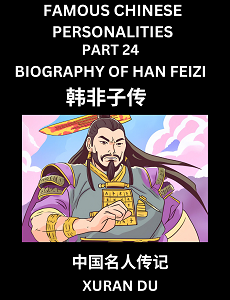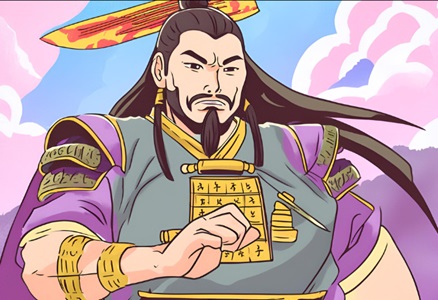Title of Biography in Chinese, Pinyin: 韩非子传 (Hán Fēizǐ Zhuàn).

Title of Biography in English: The Biography of Han Feizi/Han Fei Tzu
Check out books on my Amazon and Barnes & Noble homepages as well as the following pages to learn Biographies of famous Chinese personalities-
- Part 1 – Chinese Biography Book Series for Beginners
- Part 2 – Chinese Biography Book Series for Beginners
- Part 3 – Chinese Biography Book Series for Beginners

The Biography of Han Feizi in English (英文传记)
Han Feizi: The Prominent Representative of Legalism

Han Feizi, one of the representative figures of the Legalism School in the Warring States period, whose thoughts and works have had profound impacts on ancient Chinese politics, law, and society. Born around 280 BC, Han Feizi hailed from a noble family in the Kingdom of Han and was intelligent and eager to learn from a young age, reading extensively.
Han Feizi’s main thoughts were the rule of law and the art of ruling. He advocated that the state should maintain social order and justice through strict laws, while emphasizing the power and authority of the monarch. He believed that only when the monarch possessed absolute power could the rule of law be effectively implemented, leading to the prosperity and stability of the country.
Han Feizi’s work “Han Feizi” is a classic of the Legalism School, containing rich political, legal, military, and philosophical thoughts. He emphasized that “the law should not favor the noble, and the rope should not be bent,” meaning that everyone, regardless of status or wealth, should be subject to the law. At the same time, Han Feizi also proposed the idea of “governing the country with law and stopping punishment with punishment,” meaning that strict laws should be used to prevent crime and achieve social harmony and stability.

Han Feizi’s thoughts caused much controversy at that time, but they were also recognized and adopted by many monarchs. His thought of the rule of law had a profound impact on ancient Chinese political systems and social order, becoming an essential part of ancient Chinese political civilization.
Learn Biography Of Han Feizi in Chinese (中文传记)
韩非子,战国时期法家学派的代表人物之一,他的思想和著作对中国古代的政治、法律和社会产生了深远的影响。韩非子生于约公元前280年,出身于韩国贵族家庭,自幼聪颖好学,博览群书。

韩非子的主要思想是法治和权术,他主张国家应该通过严明的法律来维护社会秩序和公正,同时强调君主的权力和权威。他认为,只有君主掌握绝对的权力,才能有效地推行法治,实现国家的富强和安定。
韩非子的著作《韩非子》是法家学派的经典之作,其中包含了丰富的政治、法律、军事和哲学思想。他强调“法不阿贵,绳不挠曲”,即法律面前人人平等,无论贵贱贫富,都应该受到法律的制裁。同时,韩非子也提出了“以法治国,以刑止刑”的观点,即通过严明的法律来预防犯罪,实现社会的和谐稳定。
韩非子的思想在当时引起了很大的争议,但也得到了许多君主的认同和采纳。他的法治思想对中国古代的政治制度和社会秩序产生了深远的影响,成为中国古代政治文明的重要组成部分。
Han Feizi Biography Keywords- English, Chinese & Pinyin (关键词)

- 韩非子(Hán Fēizǐ):Han Feizi: The representative figure of the Legalism School in the Warring States period.
- 法家学派(Fǎjiā Xuépài):Legalism School: The school of thought advocated by Han Feizi, emphasizing the rule of law and the authority of the monarch.
- 法治(Fǎzhì):Rule of Law: The governance principle advocated by Han Feizi, emphasizing the use of strict laws to maintain social order and justice.
- 《韩非子》(Hánfēizǐ):Han Feizi: The classic work of Han Feizi, containing rich political, legal, military, and philosophical thoughts.
Pinyin of Han Feizi Biography (韩非子传记的拼音)

Hánfēizi, zhànguó shíqí fǎ jiā xuépài de dàibiǎo rénwù zhī yī, tā de sīxiǎng hé zhùzuò duì zhōngguó gǔdài de zhèngzhì, fǎlǜ hé shèhuì chǎnshēngle shēnyuǎn de yǐngxiǎng. Hán fēi zǐ shēng yú yuē gōngyuán qián 280 nián, chūshēn yú hánguó guìzú jiātíng, zì yòu cōngyǐng hàoxué, bólǎn qún shū.
Hánfēizi de zhǔyào sīxiǎng shì fǎzhì hé quánshù, tā zhǔzhāng guójiā yīnggāi tōngguò yánmíng de fǎlǜ lái wéihù shèhuì zhìxù hé gōngzhèng, tóngshí qiángdiào jūnzhǔ de quánlì hé quánwēi. Tā rènwéi, zhǐyǒu jūnzhǔ zhǎngwò juéduì de quánlì, cáinéng yǒuxiào de tuīxíng fǎzhì, shíxiàn guójiā de fùqiáng hé āndìng.
Hánfēizi de zhùzuò “hánfēizi” shì fǎ jiā xuépài de jīngdiǎn zhī zuò, qízhōng bāohánle fēngfù de zhèngzhì, fǎlǜ, jūnshì hé zhéxué sīxiǎng. Tā qiángdiào “fǎ bù ē guì, shéng bù náo qū”, jí fǎlǜ miànqián rén rén píngděng, wúlùn guìjiàn pín fù, dōu yīnggāi shòudào fǎlǜ de zhìcái. Tóngshí, hánfēizi yě tíchūle “yǐ fǎzhì guó, yǐ xíng zhǐ xíng” de guāndiǎn, jí tōngguò yánmíng de fǎlǜ lái yùfáng fànzuì, shíxiàn shèhuì de héxié wěndìng.

Hánfēizi de sīxiǎng zài dāngshí yǐnqǐle hěn dà de zhēngyì, dàn yě dédàole xǔduō jūnzhǔ de rèntóng hé cǎinà. Tā de fǎzhì sīxiǎng duì zhōngguó gǔdài de zhèngzhì zhìdù hé shèhuì zhìxù chǎnshēngle shēnyuǎn de yǐngxiǎng, chéngwéi zhōngguó gǔdài zhèngzhì wénmíng de zhòngyào zǔchéng bùfèn.


